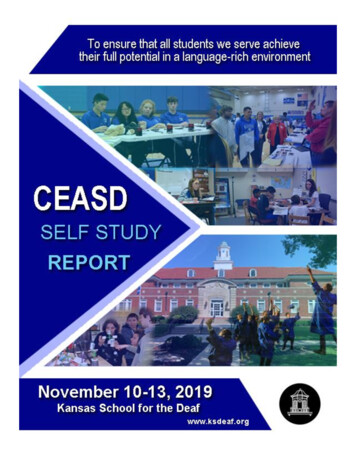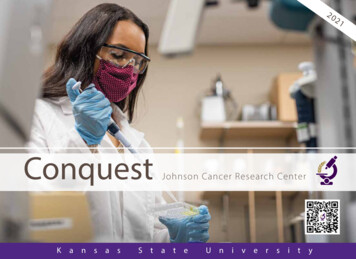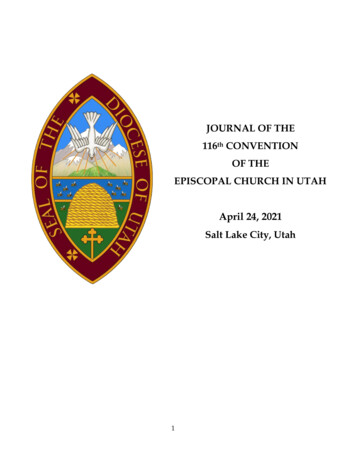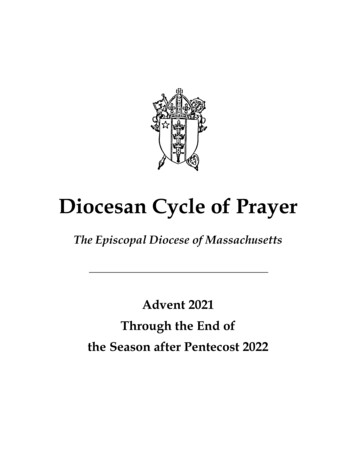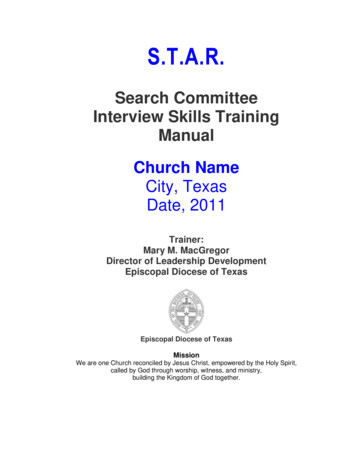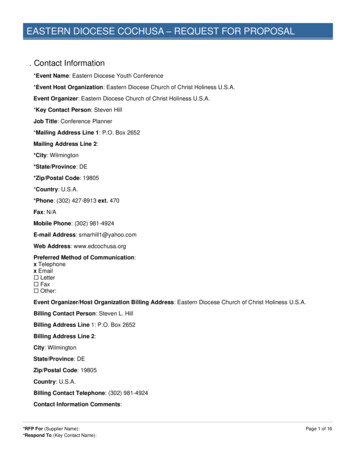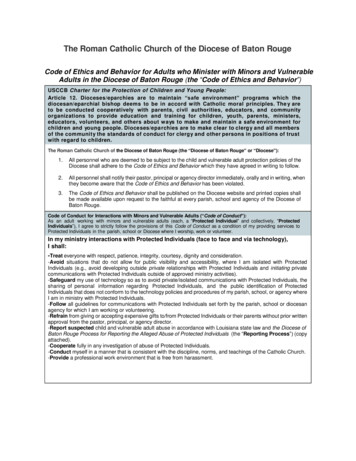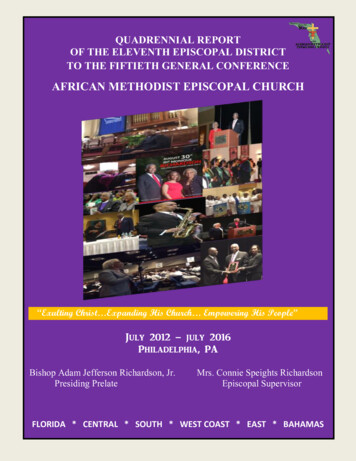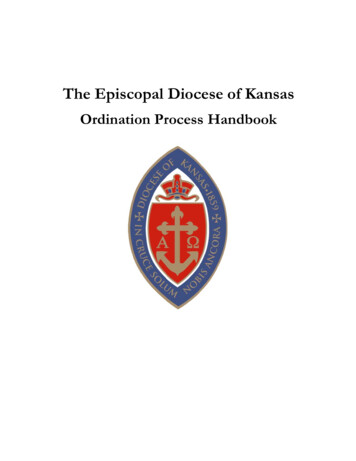
Transcription
The EpiscE copal Dioccese oof KannsasOrddinatiion Prrocesss Hanndboook
ContentsTo new inquirers . 2Three ordination tracks 3 - 4 Deacon Bi-vocational priest Seminary-trained priestStages of the ordination process . 5 - 6 Inquirer Nominee Postulant CandidateAppendix A: Sample timeline for diaconal ordination process . 7Appendix B: Sample timeline for priesthood ordination process . 8Appendix C: Ordination process instructions and forms . . 92
To new inquirersWe are so grateful for your interest in serving the church through ordination as a deacon or priest. These areexciting times to be a disciple of Jesus, and the changing nature of the church means that we need leaders whoare bold, passionate about Christ and the Episcopal Church, entrepreneurial, grounded by a deep faith androbust spiritual life, animated by the love of God, and have a proven track record or organizing and leadingothers in mission and ministry.Deacons and priests in the 21st Century will need to be willing to explore new and innovative forms ofministry alongside traditional ways of being and doing church. The call is demanding. We hope you will findthe journey richly rewarding.This handbook seeks to give a general overview of the process that leads toward ordination in the EpiscopalDiocese of Kansas. The process is long, and there are several steps along the way. Discernment begins at thelocal level; anyone seeking ordination should first be deeply rooted in a baptismal ministry in a local parish andliving faithfully in Christian life. This includes a commitment to prayer and study; a commitment to servingothers, both inside and outside the church; and a commitment to the tithe. Leading by example and doingwhat you teach is an important part of ordained ministry. You will be expected to speak to this and otherpersonal practices in your discussions with the Commission on Ministry. The process is not intended to beneedlessly bureaucratic, difficult or mysterious. However, a great trust is bestowed in ordination, and so thediscernment process must be careful, thoughtful and deliberate.A call to ordination is always a call by and to community, and so the process unfolds in ever-expanding circlesof community discernment (parish, convocation, diocese). By no means will this handbook answer all of yourquestions, so please call us with any questions you may have along the way.In the meantime, please be assured of our prayers for you as you continue to seek the guidance of the HolySpirit.The Commission on Ministry3
Three tracks toward ordained ministryThere are three basic paths through which one might be called and formed for ordained ministry in theEpiscopal Diocese of Kansas (one track for deacons and two different tracks for priests). They are:1.) DeaconDeacons are called to exercise a ministry of service that reflects the fact that Christ himself came not tobe served, but to serve. Deacons lead all of us in serving the world outside the walls of the church,“particularly as a servant to those in need.” (Book of Common Prayer, page 856). It often is said that deaconsbring the church to the world and the world to the church. A deacon’s ministry is outwardly focused. They arecalled to be agents who organize people both in the church and the world, to serve the lost, the least and thelonely. They act as catalysts for the church’s mission of service and outreach, and assist the bishop andpresbyters in proclaiming the gospel and administering the sacraments.Deacons receive their formal education through a two-year course of study at the Bishop KemperSchool for Ministry. After formation at BKSM, deacons are placed in congregations for one year of internshipexperience. Neither you nor your sponsoring parish should take for granted, or count on choosing, the parishor organization where you will serve. Deacons go where they are needed. The bishop is the final authority onplacement.2.) PriestA priest exercises a ministry of oversight in local parishes, particularly as “a pastor to the people”(Book of Common Prayer, page 856). The primary task of a priest is to “equip the saints for the work ofministry,” by coordinating, encouraging and empowering the ministry of all the baptized in a particular place.Priests are called to proclaim the gospel in work and deed, administer the sacraments, teach the faith, sharewith the Bishop in the councils of the Church, and bless and declare God’s forgiveness.A. Bi-vocational priestThere is a great need in the Episcopal Diocese of Kansas for bi-vocational priests – priests whowill serve as sacramental leaders of congregations as part of a team ministry and who will earn their primaryincome outside of church work. Currently, more than half our congregations are served by priests who serveon a part-time or non-stipendiary basis. In coming years the need for priests who are able to serve in thiscapacity may continue to increase. Individuals interested in being ordained to the priesthood who are alreadyestablished professionals in their community are strongly encouraged to explore a call to bi-vocationalministry. Bi-vocational priests receive their formal education through a three-year course of study atthe Bishop Kemper School for Ministry.B. Seminary trained priestIf an individual discerns a call to priesthood as his/her primary profession and course ofincome, he/she will need to complete a three-year course of study leading to a Master of Divinity degree at anaccredited Episcopal seminary. The bishop may offer specific counsel as to which seminary or seminariescould be best for an individual’s particular situation. Individuals should realize that while every effort is madeto place all seminary-track candidates in paid positions, relocation outside of Kansas is a possibility.4
Stages of the ordination processInquirerAn Inquirer is a person who is interested in exploring a call to ordination and has had someinitial conversations with family, local congregation and parish clergy, but has not formally begun thediocesan discernment process.NomineeA Nominee is a person who has been formally recommended by his or her home parish forordination as either a priest or a deacon. If after conversation with your family, the priest in charge ofyour congregation and Vestry, you are encouraged to move forward in the discernment process, youshould apply to be a Nominee. The application to be a Nominee is on the diocesan website under the“Resources” tab, click on “Commission on Ministry.”When your application has been received and reviewed, an appointment will be scheduled for you tomeet with the bishop. Your spouse/partner should attend this meeting with you.After meeting with the bishop, if you are admitted as a Nominee, you will need to meet at least fourtimes with your Convocation Discernment Committee. After receiving and acknowledging the letter ofnomination from the bishop, you should contact the convener of your Convocation DiscernmentCommittee to arrange for the first meeting.PostulantA Postulant is a person who has been formally admitted to the ordination process by the bishop. Onceyou have completed your meetings with the Convocation Discernment Committee, you then mayapply to become a Postulant. The application for Postulancy is on the diocesan website under the“Resources” tab; click on “Commission on Ministry.”When the diocesan office has received your application for Postulancy and other required materials,you will be scheduled to interview with the Commission on Ministry. The Commission will make arecommendation to the bishop regarding postulancy. You will be informed by official letter of thebishop’s decision. Once you have been admitted as a Postulant, you are eligible to enroll in anordination track at the Bishop Kemper School for Ministry, or to begin the process of applying toseminary.CandidateA Candidate is a person who has received official endorsement from the Commission on Ministry andthe Council of Trustees to continue his or her course toward ordination. You will apply for candidacyduring the fall semester of your final year of study (second year for diaconal students, third year forpriesthood students). The application for candidacy is on the diocesan website under the “Resources”tab; click on “Commission on Ministry.”5
Formation and EvaluationFormation for ordained ministry requires a significant commitment of time and energy. The time youwill spend in preparation will yield important insights. Broad concentrations will be in Bible, church history,theology, ethics, liturgics, church polity, and the theory and practice of ministry. Specialized courses will allowyou to concentrate on aspects of ministry particularly suited to your diaconal or priestly call. You will developa ministerial identity rooted in being part of a community that studies and prays together, and thosefriendships may well prove invaluable as you do the work of ministry after graduation.As shown in other parts of this handbook, there will be regular times when diocesan committees orofficials elicit feedback from your teachers at seminary or from faculty of the Bishop Kemper School forMinistry. Such evaluations are in place in order to help us get a clear picture of your progress. In addition toregular reports, Candidates for the priesthood will take the General Ordination Examination (GOE) inJanuary of their final year of studies and be certified by the Board of Examining Chaplains. The Board hasprovided a helpful study document found the diocesan website under the “Resources” tab; click on“Academic standards of formation.”ShepherdingOnce named a Nominee, you will be assigned a “Shepherd.” This usually is a member of theCommission on Ministry who will walk with you through the entire process toward ordination. Your shepherdwill contact you periodically to see how things are going and if he or she can be of assistance to you in yourjourney. Of course, the lines of communication should flow both ways. You are expected to contact yourshepherd for assistance and help any time you have a question, need or a problem in the process. Never let amatter go unchecked or unresolved without calling on your shepherd for advice. Dealing with such situationsearly is crucial to a smooth and positive process experience.6
Appendix ADiaconal Ordination Process Sample TimelineYear One:1. Inquirer meets with the priest in charge of their congregation and makesapplication for nomination (see checklist on page#: 10)2. Meets with the bishop regarding status as a Nominee3. Bishop’s decision is communicated through written correspondence4. Meets with Convocation Discernment Committee5. Makes application for Postulancy6. Interviews with the Commission on Ministry which makes a recommendation to the bishop7. A determination is made by the bishop regarding PostulancyYear Two:1. Begins course of study at the Bishop Kemper School for MinistryYear Three:1. Continues course of study at BKSM2. Makes application for Candidacy3. Interviews with the Standing Committee(the Commission on Ministry may request a second interview)Year Four:1. Makes application for ordination2. Ordination as a deacon and assignment to diaconal internship7
Appendix BPriesthood Ordination Process Sample Timeline(Individual circumstances may vary slightly)Year One:1. Inquirer meets with the priest in charge of your congregation and makesapplication for nomination2. Meets with the bishop regarding status as a Nominee3. Bishop’s decision is communicated through written correspondence4. Meets with Convocation Discernment Committee5. Makes application for Postulancy6. Interviews with the Commission on Ministry7. A determination is made by the bishop regarding PostulancyYear Two:1. Begins course of study at the Bishop Kemper School for Ministry or seminaryYear Three:1. Continues course of studyYear Four:1.2.3.4.Continues course of studyMakes application for CandidacyTakes the General Ordination ExaminationInterviews with the Standing Committee(the Commission on Ministry may request a second interview)5. Meets with the Board of Examining Chaplains6. Applies for ordination to the transitional diaconateYear Four/Five: 1. Ordination as a transitional deacon2. Applies for ordination to the priesthood8
Appendix COrdination Process Instructions and Forms9
To apply as a NomineeIf you are interested in ordination, you should first discuss your interest with your rector, vicar or priest incharge. After you and your priest have met together over a period of time, then you may complete theapplication process for nominee.1. Complete the application.2. Request from your rector, vicar or priest in charge a letter of recommendation to enter a formaldiscernment process. Provide evidence that you are a confirmed adult in good standing as acommunicant in a local congregation for a minimum of one year.3. Submit the following:a. A “Letter of Support and Commitment” from the vestry and clergy, which includes thefinancial commitment from the parish and stating that the nominee is a confirmed adultcommunicant in good standing. In addition to other work that may be assigned by yourparish, you are to prepare a spiritual autobiography with a maximum length of four doublespaced pages, which will be distributed to the priest and vestry. (See page 14 for spiritualautobiography guidelines.) Your priest and vestry must attest that they have read thisdocument before signing the “Letter of Support and Commitment.”b. Submit your spiritual autobiography to the diocesan office. Answer the social historyquestions on the back of the application. Complete the financial statement form as part ofthe application process.c. Submit a copy of your record of baptism and confirmation.d. Submit a current photograph, either in print or digitally.e. Please attach, to the application, a check for 200 to cover the cost of the criminalbackground check, which will be initiated by the administrator of the Commission onMinistry and conducted by Oxford Document Management Company.When the steps above have been completed, the bishop will review the material and schedule a meeting withthe applicant. The bishop will review the application information and clergy recommendations before theinterview is scheduled. If the bishop consents to further exploration of the call, the applicant will receive aletter within 45 days from the bishop, naming them a Nominee for Holy Orders. The Nominee must acceptthis nomination in writing within 30 days of the receipt of the letter of invitation.10
TheT Episcopall Dioceese of KKansasApplication for NomineeNforr Holy OrdeersPerrsonal Inforrmation Queestionnaire[ ] Diaconate[ iden Namee (if applicablle):GGender:Date of Birth:BPrresent Addreess:Ciity:State:Zip:Coontact informmationPleasse check prefferred methood of contactt:HHome:[ ]WWork:[ ]Ceell:[ ]E-mail:[ ]Prresent Occuppation:Active/Inactivve in the MiliitaryFaamily InformmationMMarital Status:: Single [ ] Married [ ] Divorced/SSeparated [ ] # of marriaages Widow(err) [ ]Sppouse/Partneer’s name:Date of BirrthSppouse/Partneer’s occupatiion:Yeear MarriedChhildrenNName(s), age(ss) and gender(s):11
Religious HistoryName of sponsoring congregation and city:Length of time in congregation:Length of time in the diocese:Ministries in current congregation (with dates):Baptism Date: Confirmation Date:Confirmed By Whom? Where?Previous application for admission as Postulant for Holy Orders: Yes [ ]No [ ]If yes, please explain:Spouse/Partner’s religious affiliation:EducationHigh School: Graduation Date:College: Graduation Date:Major: Degree:Graduate Work:Other Training or Education:Include with this application:1.2.3.4.5.6.7.Letter of Support from your rector, vicar or priest in chargeLetter of Support and Commitment from the VestryYour Spiritual AutobiographyThe required financial statementCopies of the record of your baptism and confirmationCurrent color photographAn Oxford background check will be initiated when the application isreceived in the diocesan office. The expense of the background checkis the applicant’s responsibility. Please include a 200 check made outto the Episcopal Diocese of Kansas to cover these costs.Please send a letter of introduction with this information sheet. Please wait to hear an acknowledgementbefore moving on to the next step.Signature: Date:Mailing address:Canon to the OrdinaryThe Episcopal Diocese of Kansas835 SW Polk StreetTopeka, KS 6661212
TheT Episcopall Dioceese of KKansasLetter of Support and Commitmeent from thee VestryFor NomineeTitle III,II Canon 6.6.2.aConstitutioon and Canoons 2015DDate:To the Right Reverend Cathleen Chittenden Bascom, Bishop of the Episcopal Diocese of Kansas:Frrom:Church,, KansasWWe, whose nammes appear below,bcertifyy thatis a confirmmed adultcoommunicant in good stannding in this congregationcn. By the exammination of the above naamed we declare that,inn our opinionn, this personn possesses suuch qualifications as wouuld be fitting to be nominnated for Holly Orders.Thhis judgemennt is based onn our personnal knowledge, interview aand other evvidence.Fuurthermore, wew commit tot involvemeent in’s prepparation for ordination too thediiaconate (voccational/trannsitional). Wee pledge the amountaof as our minimmum annualcoontribution too the financial support off the nomineee’s educationn and formattion.*Ihhereby certiffy that the forregoing certiificate was siggned at a meeeting of the VVestry/Bishoop’s Committtee of(naame of congregaation) duly coonvened at(tiime) on the(day) of, inn the year and thatthhe names attaached are thoose of all or two-thirdstmajority of all of the membbers of the VVestry/Bishop’sCoommittee.(siigned)Clerk of the Vestry(siigned)Rector/Vicaar/Priest in CCharge*TThe minimum finnancial support of a parish for a person it puts forwardffor Holyly Orders is 6000 per year. Pariishes unable to bbear thisfinnancial responsibbility may appeal to the Canon tot the Ordinary forf a lesser amouunt. Some finanncial support is rrequired of parishhes puttingforrth a person for ordained ministryry.13
Spiritual Autobiography(To be included with the other materials submitted in your application packet)A spiritual autobiography is different from your life story. A spiritual autobiography is the story of your faith,your belief system and how it came to be. What do you believe? What is your theology? What influenced yourbeliefs and spirituality? Who were your models and teachers? In other words, tell us about the formation ofyour spirituality and how that is continually fed, nurtured, strengthened and challenged. Your spiritualautobiography should be no more than four pages, double-spaced. You may wish to write more, which is fine,but you must edit what you send to us to meet this four-page limit. Spiritual autobiographies longer than thislimit will be returned for you to rewrite and may delay your process. We suggest you save a copy of yourspiritual autobiography for yourself, as you may be asked to speak to some of its content.Some things to consider as you are writing your spiritual autobiography:Just as we look for God’s presence and action in our scripture studies, in developing a spiritual autobiography,we likewise look for God’s presence and action in our own lived experiences. We reflect on the people, timesand events that have been significant in our spiritual lives. We are looking for the things that have made us thespiritual beings we are today. Think about Encounters with God (mystical, practical, in alone moments, through other people) Significant events (when your faith has been tested, strengthened, revealed) Experiences of spiritual growth (epiphanies, gradual enlightenment/learnings) The modeling and witness of others (the “Christ bearers” in your life)Tell your story. What were your parents or another family member’s religious or spiritual influence on you?What messages were communicated to you about God by those who had care over you? (For example, “Godloves you” or “If you’re bad, God will get you!” or “Christians are narrow-minded, judgmental people” or“God does not exist,” etc.) What early experiences had great impact on your subsequent spiritual journey? Ifyour family went to church, what was the impact of your church community on your childhood, teenage andadult life? How have later church communities you’ve been a part of affected your spiritual life?Finally, tell us what ways God is active in your life today. Through whom or what?What is your understanding of your relationship with Christ today? Say something about the commitments youhave made as a result of your life’s experiences and your sense, if any, of the Christian vocation you havedeveloped as a result.Reflect on all this before you begin writing. Make notes for yourself. Then begin writing. You may find thatyou have exceeded the four-page limit we have given you. If so, keep a copy of the entire spiritualautobiography you have written for yourself. (Your priest or discernment committee or others may also wantto see a longer spiritual autobiography.) For the Commission on Ministry, please condense any longer spiritualautobiography to the required four pages before submitting.14
TheT Episcopall Dioceese of KKansasFinanciial Assessmeent and Plannning Guide forNomineees to Holy OOrdersNName:DDate:NNumber of deependents:NumberNof inncomes in thhe family:I.Cuurrent Incomme and Assetssa. Current Income1. Youur SalaryBennefitsTottal2. Fammily SalaryBennefitsTottal3. Othher Tottal Income:b. Current Assets1. Maarket value off real estate2. Maarket value off auto3. Cassh value of life insurance4. Vallue of stock//bonds5. Vallue of trust fuund6. Vallue of savinggs, retirementt,renntal property; please specifyon the back of thet form Tottal Assets: Tottal Income annd Assets: 15
II.Current Indebtedness and Expensesa. Indebtedness:1. Balance on mortgages2. Balance on car loans3. Balance on educational loan(s)4. Charge account balances5. Other Total Indebtedness: b. Expenses1. Average monthly householdexpenses x 12a. Number of dependentsNumber of incomes2. Other major expenses not includedabove (tuition, taxes)III. Total Annual Expenses: Total Indebtedness and Expense: Future Planninga. Costs of a theological education (whether BKSM or a traditional residential seminary)1. How much do you expect it will cost?(tuition, room and board, travel, moving,other expenses) per year? For three years? 2. How much of your current income will younot have available while you are in seminary? 3. What financial resources are available tohelp you pay for your education and livingexpenses while you are in seminary? 4. Do you expect to apply for scholarships orother assistance? Yes NoIf yes, what amount? 5. How will you pay for your education andliving expenses while you are in school? 6. Do you expect to incur debt?Yes NoIf yes, How much? 7. Over what period of time do you expectto repay that debt? 8. What do you expect the monthly paymentsto be? 9. After ordination, how will you be able tomake those payments, as well as otherexpenses? 16
b. What stress will these arrangements and expectation cause for your family?Signature: Date:The information on this form, as with all forms, is kept in the strictest of confidence. Applicants are asked toprovide this information in order to demonstrate that they have a solid grasp on personal finances. This is acommitment to which you will likely be asked to contribute by underwriting some of your education on yourown. Significant financial impediments that would bar or hinder that kind of progress are important to knowand indicate. Again, please be assured that we never misuse any personal information and securely maintain it.17
To apply as a PostulantWhen the materials listed below are received by the administrator of the Commission on Ministry, theapplication will then be placed on the agenda for consideration at a Commission on Ministry meeting. Theapplication and materials must be received at least four weeks prior to the Commission on Ministry meeting.Normally, the Commission considers postulancy applications in January and March.1. Complete an Application for Postulancy.2. Before Postulancy is granted, a psychological evaluation will be required. Be certain to take to theexaminer the list of instructions provided (see pages 20 and 21, Appendix C), as well as the form onwhich they are to make a report to the bishop.3. Complete a medical examination, using the form provided by the diocese.4. Send official transcripts from colleges and universities to the Canon to the Ordinary.The Nominee then may be invited to meet with the Commission on Ministry. The Commission will provide itsrecommendation to the bishop. The bishop, in consultation with the Commission on Ministry, will make adecision about whether or not to admit you as a Postulant. This decision will be communicated to you byletter within 60 days of your interview with the Commission on Ministry. The decision of the bishop is final.18
TheT Episcopall Dioceese of KKansasApplicatioon for PostuulancyTitle III,II Canon 6.6.2.bTitle III,II Canon 8.8.2.bConstitutioon and Canoons 2015[ ] Diaconate[ ]PPriesthoodTo the Right Reverend Cathleen Chittenden Bascom, Bishop of the Episcopal Diocese of Kansas:Ihhereby makee application to be admitted by you as a Postulant for Holy Orrders.NName:Iwwas named NomineeNon:I aam a membeer of:Churchh in (city)I aam moved too seek Holy OrdersObecauuse:Iff named posttulant I wish to complete my educatioon at:[ ] Bishop Kemper Schooll for Ministryy[ ] Resideential Seminaary (chosen iinconjunnction with tthe bishop)Siignature:DDate:Inn addition to this applicattion, please havehthe folloowing submittted to the Canon to the OOrdinary:1. Psychoological evaluuation2. Medicaal examinatioon3. Officiaal transcripts from collegees and universitiesMMailing addresss:Cannon to the OrdinaryOThee Episcopal DioceseDof KansasK8355 SW Polk SttreetToppeka, KS 66661219
TheT Episcopall Dioceese of KKansasThe Psychiatric Exammination(To be comppleted by thee diocesan apppointed psycchiatrist)Pllease take thiis form to thee diocesan apppointed psyychiatrist:DDr. Karen Jordan67720 W. 121stt Street, Ste. 101OOverland Parkk, KS 662099113-647-7990NNote: It mayy take as longg as eight weeeks to scheduule an appoinntment. Pleasse plan accorrdingly.Also, please haave the psychhiatrist returnn the confideential report to the Canonn to the Ordinary at the DDiocesanOOffice at Bethhany Place.RequiredRunnder Canon III.6.5(j)Thhe canons reequire that evvery person whow desires ordinationo(oor reception iinto the ordaained ministryy of thisChhurch) underrgo an examiination to cover this person’s “mentall and nervouus as well as pphysical conddition.”Exxaminers aree urged to usee, wherever possible,ppsychological annd psycho-diiagnostic testts as a regularr part ofthheir examinattions. The Suummery Evalluation, provvided for youur use, asks onnly for answers to certainn specificquuestions. No other matterr should be included on thatt particulaar form. It is intended priimarily for suubmissionbyy the bishop to the Standding Committtee of the dioocese, and it may be shareed with otheer canonicallyyesstablished boodies, as may be required, with the knoowledge of thhe person soo examined.Inn addition to filling in thee Summary EvaluationEthaat is providedd for submisssion by the bbishop to thee StandingCoom the examiiner should bbe addressedd to the bishoopommittee, a personal letter on a separrate sheet froannswering the questions lissted below. YourYletter wiill enable thee Bishop to eexercise moree helpfully a pastoralreelationship withw the persoon examined.At least one quuarter of clerrgy who are certifiedcfor a total disabillity pension bby the Mediccal Board of theChhurch Pensioon Fund are diagnosed ass having psycchological or emotional ddisorders. In addition, maany exhibitdiistress very early in their servicesas an ordained miinister. Hencce, the significcance of youur report for bishopsannd Standing Committees.C20
1. Did the examination include a psychiatric interview? Psychological testing? Both? If tests were done,what test or tests?2. Is there indication in your examination that further investigation of this person’s mental health isneeded? If so, are you recommending that a supplementary psychiatric or neurological examination orspecial testing by a certified clinical psychologist be required.Does the applicant suffer from any psychiatric illness? Are there any signs in the present behavior ofthe applicant suggesting in your opinion that this person may become ill under the usual pressures ofclerical life?If there has been any history of mental illness or of psychiatric treatment, is there subsequentimpairment or improvement of the personality?If there any pathology or serious maladjustment or limitation of personality that, in your opinion,would disqualify the applicant for the ministry of the Church?3. What traits or characteristics of the applicant’s personality would make for, or tend to lessen,effectiveness in the ministry of the Church? In answer to this question, the Examiner is requested toreport such information, or impressions as he/she is able to obtain concerning the following matters: Rigidity of thinking and particular areas where it appears Potential intelligence and ability to use it Attitudes toward those in authority and the applicants own
B. Seminary trained priest If an individual discerns a call to priesthood as his/her primary profession and course of income, he/she will need to complete a three-year course of study leading to a Master of Divinity degree at an accredited Episcopal seminary. The bishop may offer specific counsel as to which seminary or seminaries


